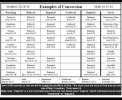-
Biblical Families is not a dating website. It is a forum to discuss issues relating to marriage and the Bible, and to offer guidance and support, not to find a wife. Click here for more information.
You are using an out of date browser. It may not display this or other websites correctly.
You should upgrade or use an alternative browser.
You should upgrade or use an alternative browser.
Meat Determining Sound Doctrine
- Thread starter Joleneakamama
- Start date
According to what is written; For by grace you have been saved through faith, and that not of yourselves; it is the gift of God, not by works, lest anyone should boast. For we are His workmanship created in Christ Jesus for good works, which God prepared beforehand that we should walk in them (Eph. 2:8-10). Being immersed in water is one of those good works which God has prepared for those He saves to walk in.Yes. Jesus saves. But from the Day of Pentecost on, how are we saved?
The word "baptize" is a transliteration of the Greek βαπτίζω, which means to wash, immerse, submerge. The word is not always a reference to a religious ritual - and certainly not one that can in some way impart salvation from sin! For example, in 1 Peter 3:21; There is also an antitype which now saves us, namely baptism (not the removal of the filth of the flesh, but the answer of a good conscience toward God), through the resurrection of Jesus Christ. Peter defines the word here for those who read his epistle saying it is NOT a physical washing - not the removal of the filth of the flesh. It is the immersion of the believer into union with the resurrection of Jesus Christ.
I understand there is some question as to the legitimacy of Mark 16, but for those who believe it is inspired there is also this:
Mark 16:15-16 NASB95 — And He said to them, “Go into all the world and preach the gospel to all creation. “He who has believed and has been baptized shall be saved; but he who has disbelieved shall be condemned.
Yes, those who have believed and been immersed in union with Christ shall be saved. You left off the last part of v:16; but he who does not believe will be condemned. It is the unbelieving who will be condemned, not the ones who have not been immersed in water.
This is a good example of where Command and Example work together. If 1 Peter 3 was the only verse we had to work with or even if we only had all the Commands, there could be an argument that it is not talking about a physical baptism. By example though we see that it is in fact a physical immersion into water. So how do we rectify 1 Peter 3 and the examples we are given? By understanding 1 Peter 3 as talking about physical immersion but for the purpose of being joined to Christ through the remission of sins, NOT just physical cleansing. In other words, Baptism without faith is fruitless for the soul.Peter defines the word here for those who read his epistle saying it is NOT a physical washing
This is an example of using one command to the exclusion of all other commands on the subject and to the exclusion of all examples given. This is the polygyny equivalent of the Adam and Eve original intent argument.For by grace you have been saved through faith, and that not of yourselves; it is the gift of God, not by works, lest anyone should boast. For we are His workmanship created in Christ Jesus for good works, which God prepared beforehand that we should walk in them (Eph. 2:8-10).
Salvation by Grace through Faith is a true statement, just like marriage is between one man and one woman is a true statement. It does not mean it is the end of the study. What examples do we have of conversion/salvation?

Baptism is not a work in which we save ourselves, it is an acceptance of the gift of God. If you are drowning and someone throws you a ring buoy and you grab on while they pull you to safety, did you save yourself by simply grabbing the buoy or did the one who threw you the buoy and pulled you in save you? Obviously the saviour is the one who presented the opportunity for salvation, not the one who accepted salvation.
More examples of God offering salvation that required salvation to be accepted:

More examples of God offering salvation that required salvation to be accepted:
Isn't every offer of God's salvation contingent on our acceptance of it?
If someone believes, they will obey and be baptized. There is no reason to say "does not believe and is not baptized." Or "believes but is not baptized."Yes, those who have believed and been immersed in union with Christ shall be saved. You left off the last part of v:16; but he who does not believe will be condemned. It is the unbelieving who will be condemned, not the ones who have not been immersed in water.
A good example of this would be Noah telling others a flood is coming and they should "believe and get on the ark." But those who do not believe will be damned. Do you have to address a situation in which people believed Noah that a flood was coming but did not get on the ark? No, because if they truly believed, they would have gotten on the ark.
Yes, and acceptance looks like obedience. Obedience may look like works, but the works are not what saves us. We are saved by Grace through faith, faith just happens to include obedience.Isn't every offer of God's salvation contingent on our acceptance of it?
Are there any examples of a believing yet unbaptized person being saved? The thief on the cross maybe?If someone believes, they will obey and be baptized. There is no reason to say "does not believe and is not baptized." Or "believes but is not baptized."
A good example of this would be Noah telling others a flood is coming and they should "believe and get on the ark." But those who do not believe will be damned. Do you have to address a situation in which people believed Noah that a flood was coming but did not get on the ark? No, because if they truly believed, they would have gotten on the ark.
Great, I'm glad we agree on that. And obedience demonstrates true saving faith. It is written, For as the body without the spirit is dead, so faith without works is dead also (James 2:26). And since we have the example of salvation from sin without a person being immersed in water, then we can rightly conclude water immersion is an act of obedience to the command to be batized; it is proof of what is written about true saving faith being active obedient faith. CheersSalvation by Grace through Faith is a true statement
Rom. 6 explains what happens when we are baptized. We are baptized into Christ's death, burial, and resurrection. Christ had not yet died, been buried, or resurrected yet when the thief died. Therefore, he could not have been required to be baptized for the remission of sins, that requirement was not yet established. The thief was under the old covenant and for all we know may have been a Jew.The thief on the cross maybe?
While he is interesting to study, if someone comes to me asking what they need to do to be saved, I am going to tell them what Peter told the Jews on the day of Pentecost and what every example since included. Can God save people who were not baptized? Of course, He can do whatever He wants, but my job is to follow the commands and example of Christ and the Apostles, both of whom preached baptism for salvation.
That is incorrect.both of whom preached baptism for salvation.
Acts 16:30, 31 And he brought them out and said, “Sirs, what must I do to be saved?”
So they said, “Believe on the Lord Jesus Christ, and you will be saved, you and your household.”
Water immersion followed (v:33) but wasn't preached as essential for salvation. Immersion in water is an act of obedience for the new believer; an outworking of true saving faith.
Also, when the Ethiopian Eunuch had asked if he should be baptized in water, Philip said that he may. Not that he should, or must, or it is imperative for your salvation.That is incorrect.
Acts 16:30, 31 And he brought them out and said, “Sirs, what must I do to be saved?”
So they said, “Believe on the Lord Jesus Christ, and you will be saved, you and your household.”
Water immersion followed (v:33) but wasn't preached as essential for salvation. Immersion in water is an act of obedience for the new believer; an outworking of true saving faith.
”And as they went on their way, they came unto a certain water: and the eunuch said, See, here is water; what doth hinder me to be baptized? And Philip said, If thou believest with all thine heart, thou mayest. And he answered and said, I believe that Jesus Christ is the Son of God.“
Acts 8:36-37
